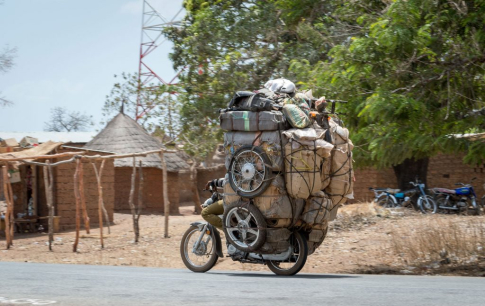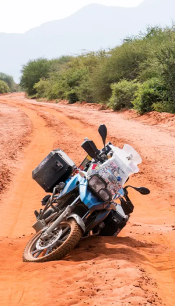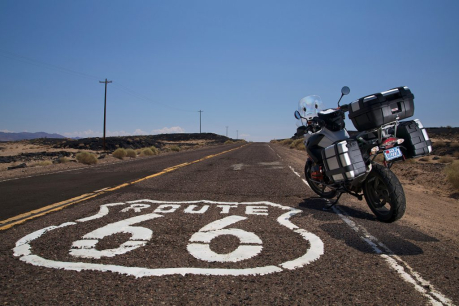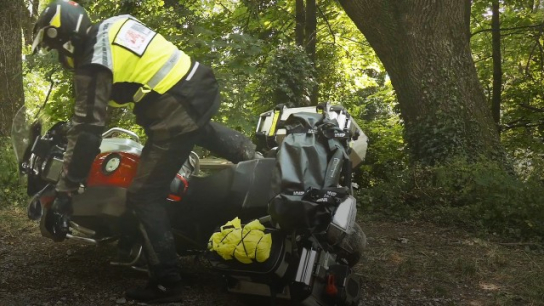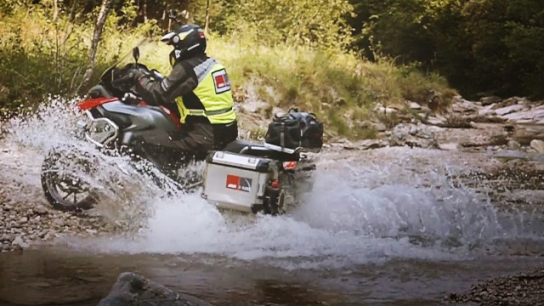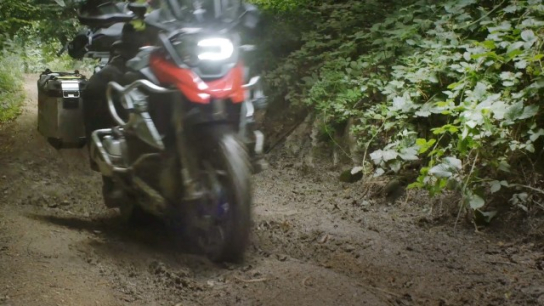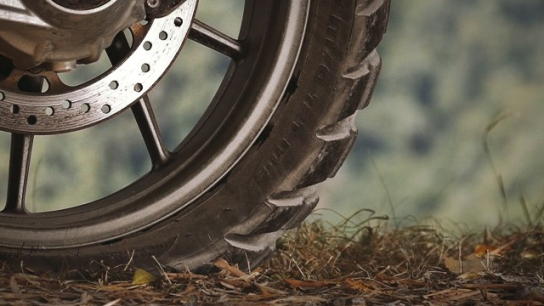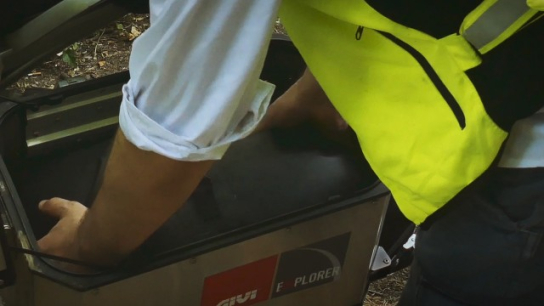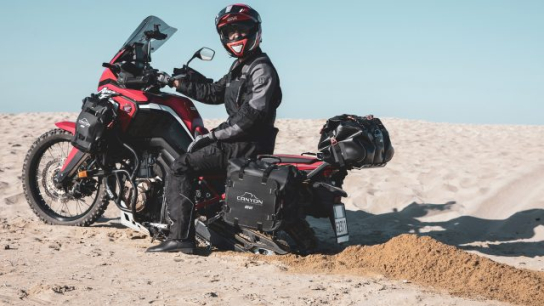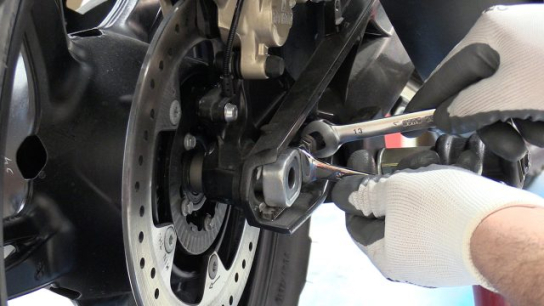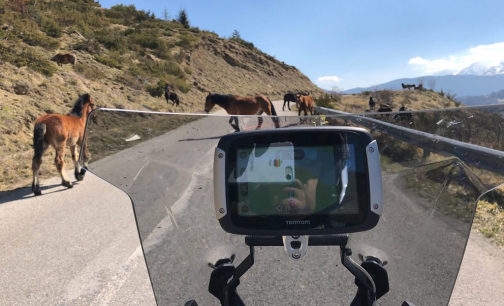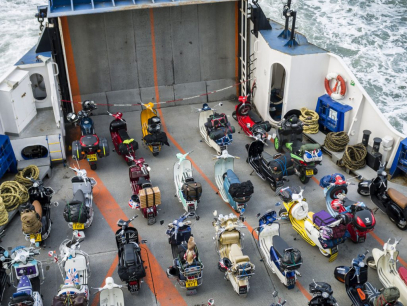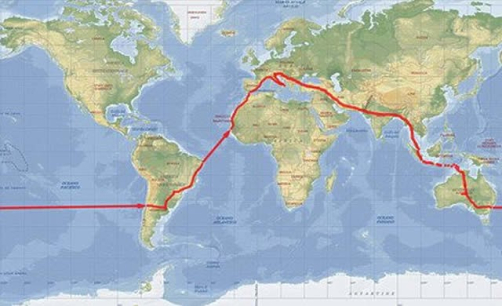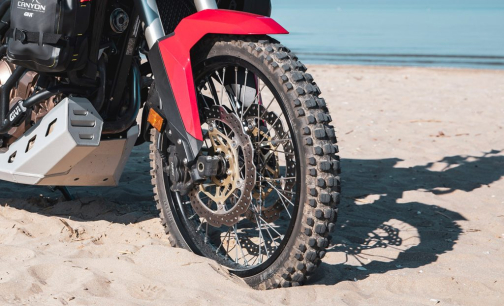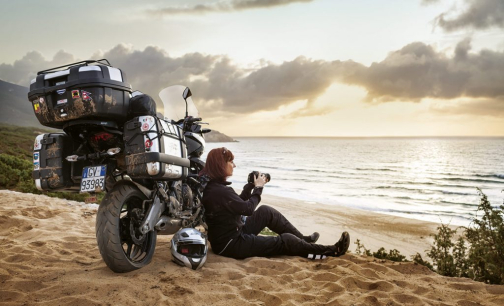Handbook for motorcycle travellers
The web is full of sites dedicated to those who are passionate about travelling by motorbike.
Many of these sites have no qualms about giving out tips taken from news reports or the experience of those who are actively involved in these types of journalistic projects. For GIVI EXPLORER we have done some research and collected (in 3 articles) the not-so-obvious tips, based on good sense and the fact that not all motor-tourists cross entire continents or have decades of experience behind them.
Always have something to eat and drink on you
Make the most of your stops at the petrol stations to grab a drink and snack. At some point during the day, they’ll be greatly appreciated. If you’re wanting to stop for dinner in a local restaurant, remember that opening hours vary. In France, you eat at 20:00, in Italy at 21:00, in Spain – not before 22:00…..
A hard saddle is better
A seat must be able to provide the rider with a certain level of comfort for long periods and many kilometres. For many users the best solution is ‘hard’ and only slightly contoured. Not hard as a rock, but having a structure that doesn’t ‘sink’ too much either. The benefits? Well, to start with, it allows the rider to maintain a correct posture, and gives freedom of movement for the body that a preformed seat doesn’t provide.
Take a break …..
Stretch your legs every so often. This way it’ll be easier to drive for longer periods before you get tired. If possible, take your break when the views are worthy. Rewarding yourself with a break in a stunning location should be a rule.
Noise
In general, not that by the exhaust. The noise we’re talking about is that of the wind.
Many factors influence it: that howling wind that passes through your helmet (rarely does it help to reduce the noise), the position of your head, the arrangement of your bags, etc.
This being said, it’s almost impossible to reduce the decibels. The thing that hurts the ears the most are acute noises. The longer we ride under these conditions, the greater the stress accumulates on your ears by the end of the day.
How can you fix this problem?
By picking up some run of the mill yellow ear plugs in a pharmacy or motor shop.
These are particularly useful as they’re able to filter the worst sounds without eliminating the noise of the engine, the sirens and other important noises on the road.
The best roads
When you want to get as many kilometres under your belt in as short a time as possible, it’s best to avoid smaller roads. In these situations the motorway represents the best choice. If, on the other hand, you are wanting to take in the view at a more leisurely speed, then it’s best to take alternative routes. Do it however, in a ‘scientific’ way. For example, Michelin has ad hoc maps of France that are called “Bison Futé”, in Germany “Ferien Strassen” and “Romantische Strasse”. Try to read up on them beforehand as it’s not easy crossing lesser known territory without the right tools.
Plan b
Many of you plan your trips in detail before leaving. If you belong to the ranks of this methodical group, don’t forget to have a plan B. Maybe the road is super boring, the weather is awful, the traffic is backed up or there are road works everywhere… Having an alternative plan ready means you’re able to solve the problem without too much stress..
Prefer paper maps?
If you’re lovers of paper maps, go for very detailed ones. In specialised shops it’s easy to compare even on identical scales (more details, easier to read, petrol stations and uneven roads marked, etc.
If you’re travelling with a passenger, also make them the navigator. You concentrate on the road and riding.
If you’re solo bikers the solution is ‘a transparent plastic sleeve on top of the tank bag’ is the best option … even when it rains.
Mountain passes
When your trip includes mountain passes, remember to check that they are indeed open before leaving (especially if you leave outside of the summer season) to avoid ending up with long detours.
How many kilometres a day?
All things considered it’s not so easy to predict. It depends on the distances and how much time you have for the whole tour. On average you could set yourself around 400km/day (giving yourself a bit of leeway for some longer pit-stops and visits), up to 800km when a stretch of the road isn’t particularly interesting, making up time to use later on more scenic routes. It’s also important to take into consideration where you clock up the miles and at what speed. Riding for 400km on smaller roads, perhaps unpaved, is much different from longer trips on a comfortable motorway.
Habits and rules of the road
Rules change. And so do speed limits and correct road behaviour. In Italy, we often ride ‘creatively’. Remember that certain bending of rules is not tolerated in other countries, and getting your license confiscated might be just around the corner. Get informed before leaving by looking up “Automobile Association” sites.
The quality of the road
Also the road conditions can be variable. In certain countries the roads can be damaged by the winter frost, and in others they can be slippery in the summer time. Be careful in the tunnels as well. Not all of them are illuminated, and entering without lifting your visor or without taking off your sunglasses could be dangerous. The eye can have trouble adjusting quickly to changes in luminosity.
Long distances on your own?
If you’ve decided to do a hard-core trip on your own, perhaps in the middle of a rather remote area …. it would be wise to let friends or relatives know before leaving. If this trip is going to take a few days, prepare a plan of attack for each day. What’s it for? To make sure that someone back ‘home’ knows where they can find you ….. if you’re late, make sure you touch base with them as soon as you can.
Petrol pumps
One of the advantages offered by the motorway, in comparison to other roads, is that there is often the possibility to fill up easily along the way, even after sunset, and on Sundays. However, it’s best to avoid letting the tank run low.
Social networks have their advantages
Use them to enrich your trip and to let others know about it. If you aren’t on Facebook, Twitter or Instagram, consider taking the plunge and becoming ‘social’ before you leave. That way, friends and family can see what you’re up to each day. And then, there’s always someone who has been to the same places as you and that could give you some valuable insights (what to see, what to avoid….). The ‘socials’ even let you sometimes meet up with friends along the way. Uploading photos, videos and updates is really easy … even for those who aren’t so tech savvy.
Regulate your body temperature
In the sense that enormous progress has been made in terms of the technologies available to cool or warm up the body through different materials in contact with the skin. So why continue to suffer the heat or cold when there are so many alternatives these days? Buy yourself technical underwear before you leave. You won’t be sorry.
Check your bike regularly
This operation is truly important and should be done every morning before leaving, especially if the itinerary the day before was on dirt roads, through fords or roads full of pot holes… Check the tire tread, the brakes, any possible oil leaks, the petrol in the tank, and the chain.
An early start to the day
Start the day early to end it a bit earlier. Many travellers adopt this philosophy. Out of bed at 6:00, shower (when possible), breakfast, check the bike and leave no later than 8:00. It’s a fantastic feeling to watch the world wake up from the saddle of your bike. Getting to your destination not too late means that you have more time to work out where to stay, if the bike is safe and protected enough etc.
Travel light
The longer the trip is, the more carefully the baggage situation needs to be examined. The advice from many experienced motorbike travellers is to take with you only the bare essentials (in addition to the technical clothes to wear on the road and the rainproof suit). A list from a website recommends: a lock, smart phone & charger, wallet, LED torch, a multi-tool, 2 pairs of underpants and socks, a pair of jeans and a couple of t-shirts. Then also a towel and a first aid and puncture kit. Perhaps also a rainproof hat.
Don’t wait until you’re thirsty
Few of us drink enough water each day; this error becomes more serious if we find ourselves under the hot blazing sun in a hot country. To avoid getting dehydrated, it’s important to drink before you get thirsty. It’s a good idea to also just take sips regularly. Otherwise, you might too soon get headaches, sore muscles, feel nauseous or faint. A day spent on the bike in a desert terrain, could mean that a litre of water each hour is necessary. Think ahead and make sure you have enough space to transport an adequate amount of fluids.
Motorbike and ferry
Many people say they prefer a side-stand to a centre-stand. On condition you secure the motorbike with straps in the cargo hold. Never forget that movement on a boat can be from side to side, but also forward to back: so remember to leave your bike in gear and to fasten the front brake with a strap.
Another thing: if the motorbikes are lined up side by side, be careful of those next to yours and if necessary help the owner secure their motorbike correctly. Remember to take everything you need with you: usually the cargo hold of the ferry is closed until arrival.
Make sure your personal data is within easy reach
Just as you should never travel without one or more emergency numbers on you, you should also make your personal info accessible in case of an accident or momentary incapacity to talk. Which data? For example info about your health (medical prescriptions, pathologies, any allergies, blood group, etc.)
More on gps and paper maps
On the web, many people suggest memorizing your trip on your GPS before leaving so that you can then use it in the off-line mode. The idea is that a GPS that is always on, might distract you while riding (it’s better to stop every hour or so to check).
The pluses of having a paper map, instead of a GPS, are that you can view a bigger area than on the screen of your navigator or smartphone, and there’s no need to charge it.
Nourishing yourself intelligently makes all the difference
The post lunch slump is difficult to combat with just a black coffee. If you start feeling drowsy on the road, pull over immediately. Resisting a delicious slice of that cake in that cute little coffee shop isn’t easy, especially when there’s no one to remind you. Learn to follow an ‘athlete’s’ diet. So, a breakfast of carbohydrates, a light lunch and a couple of snacks of fruit, muesli or yoghurt during the day. Dinner can be more satisfying … as long as you’ve already reached your destination.
The road is always longer than you expect
If you’re not used to riding a motorbike for more than a couple of hours a day (in other words if you’re a newbie to long distances), don’t jump on your bike to go off on a trip where you’ll have to ride for at least 5-6 hours. Tiredness and lack of experience can play horrible tricks on you when on the road. It’s best to work up your experience gradually.
A spare pair of glasses and binoculars
If you wear glasses, remember to take a spare pair along with you. Perhaps you could pick them up in the chemist for a good price. It’s important to have them on you when you need them (remember Murphy’s law): when travelling it’s easier to break or lose them. While on the optical subject … a pair of binoculars, to keep handy, can be useful on a number of occasions. There are some super compact models of a high quality on the market.
A windscreen is always worth considering
Forget about how it looks and consider attaching a windscreen in case you decide to go on a trip on a bike without protection. This simple accessory can make the difference in how comfortable you are and it would be foolish not to take into consideration purchasing one, or even substituting one if that which is already fitted on the bike is not protective enough.
Feeling the wind on your face is great …… but after 2 or 3 hours the novelty wears off, especially if you’re travelling on average at 100km an hour.

1) not everybody sits on the saddle in the same way
It’s often talked about how important it is to sit correctly in the office since so many hours are spent there in front of the computer ….. and what about those who spend hours and hours on their bike?The position considered comfortable for a ride of an hour or two can become unbearable when the road gets longer. Back pain is around every corner!
Motorcycling companies decide on the height of the seat, the distance of the handles Etc. in base of the standard parameters (let’s say on an average body). If you are outside this standard body type it’s very possible you should evaluate the possibility of making adjustments to the producer’s idea of the correct positioning. Often it’s enough to make a small adjustment, and your level of comfort on the road will alter considerably.
2) never trust the forecast…
Are you happy because you woke up with the sun shining down on you? Does the weather seem perfect? Never let your guard down. You might also find yourself in the middle of a blizzard in another 50km, with rain and freezing temperatures. There are countries where the weather conditions change repeatedly. Don’t be caught unaware. Your waterproof clothing must be in easy reach. Searching though your luggage to find it while you’re increasingly becoming wetter and wetter …….. is not an ideal situation.
3) avoid getting back on the road in the evening
When possible, look for a hotel that has its own restaurant/bar or one nearby. The point is to avoid getting back on the road after sunset in unknown areas and especially if that day’s journey has been long and tiring.
4) in a hurry to leave the next morning?
Is the destination at the end of the day a city with a good deal on a hotel or motel for the night? Have you planned on setting off early the next morning? Consider looking for a room on the outskirts of the city, which would be more convenient when setting off: it allows you to avoid the rush hour city traffic.
5) always in a hurry to set off?
If you don’t have the police on your heels, enjoy your trip. If along the road you see something interesting, pull over. It might prove to be a memorable pit stop. If you find yourself on the other side of the world, you very likely won’t have another chance to come back. It’s better to set yourself back a few hours than to have any regrets!
6) maps and smartphones – again
If you’re travelling alone, to avoid unfolding and folding the paper map, fumbling around for your glasses etc… you could take a snap of the portion of the map that you need with your smartphone (through the app called CamScanner you could save it as a pdf, even if in our opinion a photo works just as well). This way, it’s enough to pull over, zoom in to the point that you’re interested in. It’s very convenient and the light of the screen means there’s no need to search for a torch when there isn’t much light.
7) useful objects and accessories? Evaluate these
A short metal cable, with rings on each end (can easily be found in the anti-theft section for bikes) and a numeric lock (but the helmet one that comes with the bike also works well), can give an extra protection to a bag, a jacket.. during a brief stop.
A small towel, or even better, a synthetic shammy cloth to keep on hand in the morning, to wipe the dew off your seat, and clean the windscreen and mirrors before leaving.
A light, foldable cover for your bike to cover your bike at night. It keeps it dry and often can deter possible thieves.
A hydration kit to stick in your backpack so that you can drink while on the road. These are used in the off-road world, but they’re also useful if you’re riding in summer in particularly hot areas.
Bags that will keep your clothing dry. Even though the hard side cases get removed from your bike each evening, the clothing inside can still take on humidity. For sale you can find soft ad hoc bags to insert inside your side and top case. If you went on your trip without them, a regular, large bin bag can be used instead.
Eye drops are often left at home. But it’s easy to pick some up in any chemist. Use them on days when you cover lots of ground, on your petrol breaks. They’ll make you feel better.
8) booking on line almost always means better prices
Always search on the net to see if it’s worth booking a hotel or B&B online, even a couple of blocks from you. Bookings done on line, rather than turning up directly at reception, can be of better value in number of situations. At times even, a quick search on line might turn up an available room for that hotel you’ve just ridden past with the ‘no vacancy’ sign. It’s all to do with different conventions. If you can access the net, try it out.
9) motorbike vacation or a test of stamina?
On a long tour, plan a day of relaxation each week, perhaps even to do nothing. Time to laze about might be a luxury, but in many cases it might be needed to remind yourself you’re on holiday, and it’s not a race to the end.
10) the motorbike …… safe
If your trip takes you far from home, don’t leave without a spare key … that you will obviously keep separate from the main one. A good idea is to hide it in some part of the motorbike. Perhaps by using a metallic strap or a strong tape or undoing the light or tail-light and inserting it there. Your choice. Many motorcyclists also hide small amounts of money. The seat covering is also a good hidey-hole.
11) be realistic
It’s nice to dream, but it’s better done in bed. When you’re travelling by bike in an unknown area, try to be realistic, especially with the number of daily kilometres you plan on clocking up. For example, in scenic areas that aren’t flat 200/250km can easily fill up your day. Don’t take for granted good road conditions. Make sure you take enough stops.



